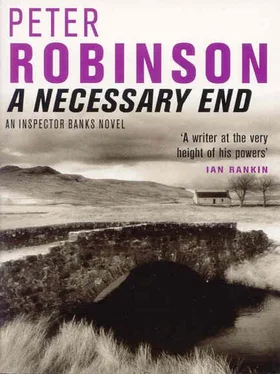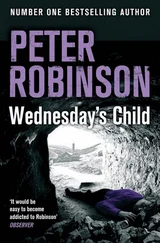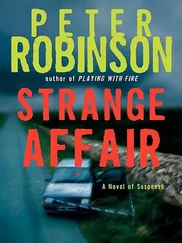Peter Robinson - A Necessary End
Здесь есть возможность читать онлайн «Peter Robinson - A Necessary End» весь текст электронной книги совершенно бесплатно (целиком полную версию без сокращений). В некоторых случаях можно слушать аудио, скачать через торрент в формате fb2 и присутствует краткое содержание. Год выпуска: 1989, ISBN: 1989, Издательство: Avon, Жанр: Полицейский детектив, на английском языке. Описание произведения, (предисловие) а так же отзывы посетителей доступны на портале библиотеки ЛибКат.
- Название:A Necessary End
- Автор:
- Издательство:Avon
- Жанр:
- Год:1989
- ISBN:9780330514729
- Рейтинг книги:5 / 5. Голосов: 1
-
Избранное:Добавить в избранное
- Отзывы:
-
Ваша оценка:
- 100
- 1
- 2
- 3
- 4
- 5
A Necessary End: краткое содержание, описание и аннотация
Предлагаем к чтению аннотацию, описание, краткое содержание или предисловие (зависит от того, что написал сам автор книги «A Necessary End»). Если вы не нашли необходимую информацию о книге — напишите в комментариях, мы постараемся отыскать её.
A Necessary End — читать онлайн бесплатно полную книгу (весь текст) целиком
Ниже представлен текст книги, разбитый по страницам. Система сохранения места последней прочитанной страницы, позволяет с удобством читать онлайн бесплатно книгу «A Necessary End», без необходимости каждый раз заново искать на чём Вы остановились. Поставьте закладку, и сможете в любой момент перейти на страницу, на которой закончили чтение.
Интервал:
Закладка:
"Am I ever wrong? Look, before you choke, I've got to go now. I'll be in touch later."
Though where he had to go he wasn't quite certain. There was the solicitor, but that wasn't until two-thirty. Feeling vaguely depressed, he lit another cigarette and went over to the window. The Queen's Arms, that was it. A pie and a pint would soon cheer him up. And Burgess had made a tentative arrangement to meet there around one-thirty and compare notes.
II
Banks found the offices of Courtney, Courtney and Courtney on Market Street, quite close to the police station. Too close, in fact, to make it worthwhile turning on the Walkman for the journey.
The firm of solicitors was situated in what had once been a tea-shop, and the new name curved in a semicircle of gold lettering on the plate-glass window. Banks asked the young receptionist for Mr Lawrence Courtney, and after a brief exchange on the intercom, was shown through to a large office stacked with legal papers.
Lawrence Courtney himself, wedged behind a large executive desk, was not the prim figure Banks had expected from their phone conversation-three-piece suit, gold watch chain, pince-nez, nose raised as if perpetually exposed to a bad smell-instead he was a relaxed, plump man of about fifty with over-long fair hair, a broad, ruddy face and a fairly pleasant expression. His jacket hung behind the door. He wore a white shirt, a red and green striped tie and plain black braces. Banks noticed that the top button of the shirt was undone and the tie had been loosened, just like his own.
"Seth Cotton's will," Banks said, sitting down after a brisk damp handshake.
"Yes. I thought you'd be interested," said Courtney. A faint smile tugged at the corners of his pink, rubbery lips.
"When did he make it?"
"Let me see…. About a year ago, I think." Courtney found the document and read off the date.
"Why did he come to you? I'm not sure how well you knew him, but he didn't seem to me the kind of person to deal with a solicitor."
"We handled the house purchase," Courtney said, "and when the conveyance was completed we suggested a will. We often do. It's not so much a matter of touting for business as making things easier. So many people die intestate, and you've no idea what complications that leads to if there is no immediate family. The house itself, for example. As far as I know, Mr Cotton wasn't married, even under common law."
"What was his reaction to your suggestion?"
"He said he'd think about it."
"And he thought about it for two years?"
"It would appear so, yes. If you don't mind my asking, Chief Inspector, why all this interest in his reason for making a will? People do, you know."
"It's the timing, that's all. I was just wondering why then rather than any other time."
"Hmmm. I imagine that's the kind of thing you people have to think about. Are you interested in the contents at all?"
"Of course."
Courtney unfolded the paper fully, peered at it, then put it aside again and hooked his thumbs in his braces. "Not much to it, really," he said. "He left the house and what little money he had-somewhere in the region of two thousand pounds, I believe, though you'll have to check with the bank — to one Mara Delacey."
"Mara? And that's it?"
"Not quite. Oddly enough he added a codicil just a few months ago. Shortly before Christmas, in fact. It doesn't affect the original bequest, but merely specifies that all materials, monies and goodwill relating to his carpentry business be left to Paul Boyd, in the hope that he uses them wisely."
"Bloody hell!"
"Is something wrong?"
"It's nothing. Sorry. Mind if I smoke?"
"If you must." Courtney took a clean ashtray from his drawer and pushed it disapprovingly towards Banks. Undeterred, Banks lit up.
"The way I see things, then," Banks said, "is that he left the house and the money to Mara after he'd only known her for a year or so, and the carpentry business to Paul after the kid had only been at the farm for a couple of months."
"If you say so, Chief Inspector. It would indicate that Mr Cotton was quick to trust people."
"It would indeed. Or that there was nobody else he could even consider. I doubt that he'd have wanted his goods and chattels to go to the state. But who knows where Boyd might have got to by the time Cotton died of natural causes? Or Mara. Could he have had some idea that he was in danger?"
"I'm afraid I can't answer that," Courtney said. "Our business ends with the legal formalities, and Mr Cotton certainly made no mention of an imminent demise. If there's anything else I can help you with, of course, I'd be more than willing."
"Thank you," said Banks. "I think that's all. Will you be informing Mara Delacey?"
"We will take steps to get in touch with beneficiaries in due course, yes."
"Is it all right if I tell her this afternoon?"
"I can't see any objection. And you might ask her — both of them, if possible — to drop by the office. I'll be happy to explain the procedure to them. If you have any trouble with the bank, Chief Inspector, please refer them to me. It's the National Westminster — or NatWest, as I believe they call themselves these days — the branch in the market square. The manager is a most valued client."
"I know the place." Know it, Banks thought, I practically stare at it for hours on end every day.
"Then goodbye, Chief Inspector. It's been a pleasure."
Banks walked out into the street more confused than ever. Before he got back to the station, however, he'd managed to put some check on his wild imaginings. The will probably didn't come into the case at all. Seth Cotton had simply had more foresight than many would have credited him with. What was wrong with that? And it was perfectly natural that, with his parents both dead and no close family, he would leave the house to Mara. And Paul Boyd was, after all, his apprentice. It was a gesture of faith and confidence on Seth's part.
Even if Mara and Paul had known what they had coming to them, neither, Banks was positive, would have murdered Seth to get it. Life for Mara was clearly better with Seth than without him, and whatever ugliness might be lurking in Boyd's character, he was neither stupid nor petty enough to kill for a set of carpenter's tools. So forget the will, Banks told himself. Nice gesture though it was, it is irrelevant. Except, perhaps, for the date. Why wait till two years after Courtney had suggested it before actually getting the business done? Procrastination?
It also raised a more serious question: had Seth felt that his life was in danger a year ago? If so, why had it taken so long for the danger to manifest itself? And had that fear somehow also renewed itself around Christmas time?
Before returning to his office, he nipped into the National Westminster and had no problem in getting details of Seth's financial affairs, such as they were: he had a savings account at £2343.64, and a current account, which stood at £421.33.
It was after three-thirty when he got back to the station, and there was a message from Vic Manson to the effect that, yes, fibres matching those from the duster had been found on the typewriter keys. But, Manson had added with typical forensic caution, there was no way of proving whether the machine had been wiped before or after the message had been typed. The pressure of fingers on the keys often blurs prints.
Banks's brief chat with Burgess over lunch had revealed nothing new, either. Dirty Dick had seen Osmond and got nowhere with him. Early in the afternoon he was off to see Tim and Abha, and he was quite happy to leave Mara Delacey to Banks. As far as Burgess was concerned, it was all over bar the shouting, but he wanted more evidence to implicate Boyd or Cotton with extremist politics. Most of the time he'd had his eye on Glenys, and he'd kept reminding Banks that it was her night off that night. Cyril, fortunately, had been nowhere in sight.
Читать дальшеИнтервал:
Закладка:
Похожие книги на «A Necessary End»
Представляем Вашему вниманию похожие книги на «A Necessary End» списком для выбора. Мы отобрали схожую по названию и смыслу литературу в надежде предоставить читателям больше вариантов отыскать новые, интересные, ещё непрочитанные произведения.
Обсуждение, отзывы о книге «A Necessary End» и просто собственные мнения читателей. Оставьте ваши комментарии, напишите, что Вы думаете о произведении, его смысле или главных героях. Укажите что конкретно понравилось, а что нет, и почему Вы так считаете.












